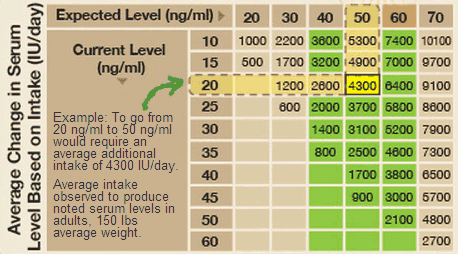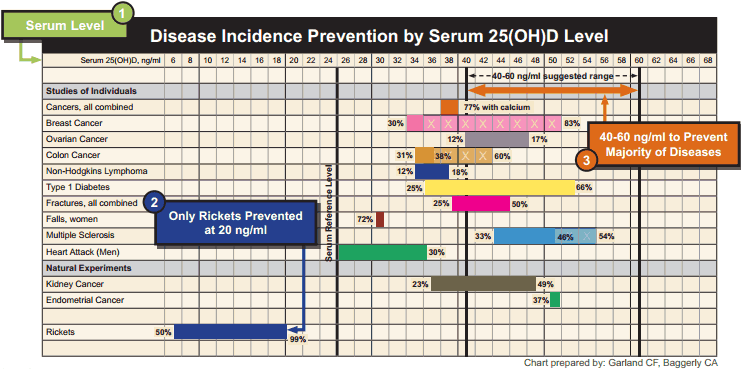Best Vitamin D Supplements in 2021
Depending on the source of vitamin D (e.g. animal-based vs. plant-based) and whether the supplement contains co-factors that aid in the absorption of vitamin D, we have categorized all supplements available on the market into four categories:
1. Animal-sourced vitamin D with added co-factors
2. nimal-sourced vitamin D without co-factors
3. Vegetarian vitamin D with some natural co-factors
4. Vegan vitamin D without co-factors
Below we have listed our top picks in each category:
1. Animal-Sourced Vitamin D with Added Co-factors
The most common source of vitamin D is lanolin, which is the wax found on the wool of sheep. 95% of all vitamin D supplements available on the market are derived from lanolin since this substance is relatively inexpensive, which translates into low prices for consumers.
The executive director of the Vitamin D Council, Dr. Cannell, has formulated an advanced lanolin vitamin D supplement. This formulation was developed based on research that showed that vitamin D needs certain co-factors such as boron, vitamin K2, zinc, and magnesium, to enable it to get into the cells of your body. Without these extra ingredients, the vitamin D supplements you take cannot be fully absorbed and utilized.
Dr. Cannell's Advanced Vitamin D
by Purity Products
 |
Contents: 60 capsules |
2. Animal-Sourced Vitamin D without Co-factors
Supplements that fall in this category contain lanolin-based vitamin D3 but none of the necessary co-factors. In order to aid the absorption of this vitamin D supplement, you need to also take a multivitamin that contains boron, vitamin K2, zinc, and magnesium.
D-5000
by Thorne Research
 |
Contents: 60 capsules |
Vitamin D3 Cholecalciferol
by Solgar
 |
Contents: 100 capsules |
3. Vegetarian Vitamin D with Some Co-factors
Vegetarian vitamin D manufacturers use a special cultivation method in which they feed lanolin-based vitamin D to yeast (Saccharomyces cerevisiae). Then through the process of fermentation, the nutrients are transformed by the yeast into a more "natural" form of vitamin D that includes a number of co-factors, such as probiotics, enzymes, and antioxidants. These co-factors help with the absorption of vitamin D by your body. However since more important co-factors such as boron, vitamin K2, zinc, and magnesium are missing, it is still recommended to take this supplement with a multivitamin including the above nutrients.
Vitamin Code RAW D3
by Garden of Life
 |
Contents: 120 capsules |
Vitamin D3
by MegaFood
 |
Contents: 90 tablets |
4. Vegan Vitamin D without Co-factors
The vitamin D used in vegan supplements is extracted from plant-based sources, such as lichen (a combination of fungus and algae) or mushrooms. This category of supplements contains only vitamin D3 and none of the necessary co-factors required for its absorption. In order to aid the absorption process, make sure that you are taking a multivitamin that includes boron, vitamin K2, zinc, and magnesium.
Vegan D3
by Country Life
 |
Contents: 60 softgels |
Vitamin D3
by Nature's Plus Source of Life Garden
 |
Contents: 60 capsules |
Which vitamin D supplement do we recommend?
If you are already taking a multivitamin that contains boron, vitamin K2, zinc, and magnesium on a daily basis, you can take any of the above supplements and be assured the the vitamin D in them will be adequately absorbed by your body.
If you do not take a daily multivitamin, your best bet would be Dr. Cannell's Advanced Vitamin D supplement by Purity Products.
Finally, if you are vegan or vegetarian and you want to avoid animal-sourced products, your selection would be limited to each respective category.
Why do I need to take vitamin D supplements?
All systems in our bodies need vitamin D, so a deficiency in this essential nutrient often contributes to the development of disease. For example, children who are severely deficient in vitamin D develop rickets, while adults who do not have adequate vitamin D in their system are likely to experience a bone softening condition known as osteomalacia.
Clinical research shows that mild vitamin D deficiency predisposes people to a variety of chronic diseases, such as:
- Osteoporosis
- Impairments in immune functioning
- Autoimmune diseases, such as juvenile diabetes and multiple sclerosis
- Cancers of the breast, ling colon, and prostate, as well as lymphoma
- Hypertension
- Complications in pregnancy
- Cardiovascular disease
Since all these conditions are linked to vitamin D deficiency, you need to ensure you maintain sufficient levels of this vitamin in your system. Otherwise, you are likely to lose the battle against these chronic diseases.
How did you determine the best vitamin D supplements?
We've been analysing vitamin supplements for years. As a result we have built a database of manufacturers that consistently deliver high quality products. We picked the best vitamin D supplements you see above, based on the reputation score of the manufacturer. We also looked at test analysis reports provided by third-party testing labs in order to confirm that each of the above products meets our high-quality standards.
How does vitamin D work?
Vitamin D is a key that unlocks your DNA. It essentially tells your genes what to do. The genes are the computer mastermind behind your body. When a cell wears out, it's your genes that regulate the production of a new cell. When your body doesn't have enough of one enzyme or has too much of a certain protein, it is your genes that need to increase or decrease the production of that enzyme or that protein.
2000 of the genes in your body are waiting for an adequate amount of vitamin D so that they can be told what to do. Without it the body cannot signal those genes to act as they should.
How do I check my vitamin D level?
Besides going to your doctor for a blood draw and lab test, you can join the D*action project, which is a global public health initiative that aims to solve the worldwide epidemic of vitamin D deficiency. Once of the projects sponsors, GrassrootsHealth, offers blood spot test kits with laboratory analysis completed by ZRT Labs. The price of each individual test is $60.00.
What is the recommended daily dose of vitamin D?
To maintain the recommended concentration of 25(OH)D (vitamin D), you need to take in at least 4000IU/day. Between skin exposure to sunlight and food sources, the average person’s intake of vitamin D is about 2000IU/day, which is half of what we need to stay healthy. To make up this difference, most people need to take vitamin D supplements that provide 1000 to 3000 IU/day.
To determine the exact dosage of vitamin D supplements you need, the first step is find out what your current level of vitamin D is by having it tested. Once you have this baseline measure of vitamin D, then use this chart to find out the supplement dose of vitamin D you need.
Table 1: How much vitamin D you need to supplement with?

Source: Grassroots Health
If a person needs to have a vitamin D blood serum level of 50ng/ml, but tests show a current vitamin D concentration level of 20ng/ml, then you need a supplemental vitamin D dose of 4300 IU/day.
What is the best vitamin D blood serum concentration?
A group of 42 researchers and practitioners gathered by GrassrootsHealth all agreed a vitamin D blood serum concentration range of 40 to 60 ng/ml is the minimum needed to maintain good health.
This consensus is supported by a research study of native Equatorial African tribes that have continuous exposure to the sun since they live in the nude. When the scientists conducted blood tests to determine the vitamin D levels of individuals in the tribe, they found their levels to be around 48ng/ml. The authors concluded that since DNA studies have shown that the ancestors of early humans originally come from this area of Africa, the vitamin D concentration of 48 ng/ml is most likely the natural optimal level of vitamin D.
Why is the RDA for vitamin so much less than what nutritional researchers advise?
The Institute of Medicine established the recommended daily allowance (RDA) for vitamin D as 600 IU/day for people under the age of 70 and 800 IU/day for adults over the age of 70.
A couple decades ago, most doctors did not consider vitamin D to be crucial for optimal health, while they did acknowledge some was needed to help the body use calcium to maintain the strength of teeth and bones. During the last decade, however, many studies conducted throughout the world have discovered the importance of vitamin D in maintaining overall health. This research provides substantial evidence that we need more than the RDA of vitamin D to stay healthy.
Is this backed up by real research?
Yes, here is a summary of the latest research findings:
- 77% of all cancer cases can be prevented with vitamin D serum of 38 ng/ml
- 83% of Breast Cancer cases can be prevented with vitamin D serum of 50 ng/ml
- 17% of Ovarian Cancer cases can be prevented with vitamin D serum of 47 ng/ml
- 60% of Colon Cancer cases can be prevented with vitamin D serum of 42 ng/ml
- 18% of Non-Hodgkins Lymphoma cases can be prevented with vitamin D serum of 37 ng/ml
- 66% of Type 1 Diabetes cases can be prevented with vitamin D serum of 52 ng/ml
- 50% of Bone Fractures can be prevented with vitamin D serum of 44 ng/ml
- 54% of Multiple Sclerosis cases can be prevented with vitamin D serum of 54 ng/ml
- 30% of Heart Attack cases in men can be prevented with vitamin D serum of 35 ng/ml
- 49% of Kidney Cancer cases can be prevented with vitamin D serum of 47 ng/ml
- 37% of Endometrial Cancer cases can be prevented with vitamin D serum of 50 ng/ml
Table 2: Disease Incidence Prevention by Serum 25(OH)D Level
Which organizations participate in this research?
Research teams from the following organizations based in United States, Canada, United Kingdom, Germany, Austria, Japan and New Zealand are currently at the forefront of vitamin D research:
- Harvard University (United States)
- Oxford University (United Kingdom)
- University of California, Los Angeles (United States)
- University of Toronto (Canada)
- Boston University (United States)
- Institute VitaminDelta (Germany)
- Creighton University (United States)
- Emory University (United States)
- International Medical Center of Japan (Japan)
- University of California, San Diego (United States)
- Linus Pauling Institute (United States)
- McGill University (Canada)
- Massachusetts General Hospital (United States)
- Medical University of Graz (Austria)
- Medical University of South Carolina (United States)
- University of Auckland (New Zealand)
- Roswell Park Cancer Institute (United States)
- Sunlight, Nutrition and Health Research Center (United States)
- University at Albany-SUNY (United States)
- University of Alberta (Canada)
- University of California, San Francisco (United States)
- National Institute for Medical Research (United Kingdom)
- University of Saskatchewan (Canada)
- Mattapan Community Health Center (United States)
- Reading Hospital Cancer Center (United States)
- Vienna Medical University (Austria)
- Roswell Park Cancer Institute (United States)
- Steiner Medical and Therapeutic Center (United States)
Why no pharmaceutical companies participate in the vitamin D research?
The answer is simple. Vitamin D was discovered many decades ago and cannot be patented. Plus cholecaciferol (vitamin D3) is dirt cheap and currently a 1000IU capsule of vitamin D retails for as little as 4 cents. Pharmaceutical companies are for-profit enterprises and if they invested money in vitamin D research they would not be able got get a return on their investment. That is why the only hope for the advancement of vitamin D research lies in obtaining funding from government grants and private donations.
